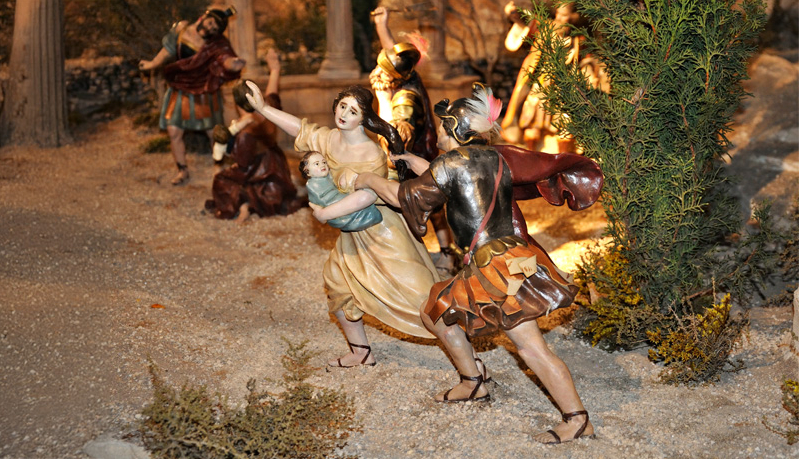
The familiar nativity story was especially topical this year, carrying associations with current headlines. Passages read or recited by children in Christmas plays; by narrators in special Christmas services; or by volunteers playing angels, kings, wise men, and shepherds for groups of children and adults on nativity walks through city neighbourhoods, reminded us that the infant Jesus also had to flee with his parents as a refugee from the murderous intentions of a ruthless ruler. Like millions around our world today.
Each time I followed the reading of Luke chapter 2, the word ‘Syria’ jumped off the page for me: This was the first census that took place while Quirinius was governor of Syria (Luke 2:2). I had not connected the nativity story with Syria before. As governor, Quirinius was responsible to assess the province of Judea for tax purposes. This was the context of the most inconvenient journey Joseph and the expectant Mary had to make to Bethlehem. The decree would have been enforced from Damascus.
This week Syrian believers—from one of the oldest Christian communities in the world—celebrated Christmas with a mixture of fear and hope now that their dictator himself has fled. Their fear of the past record of the Islamist rebels now in control was mixed with the hope that HTS (Hay'at Tahrir al-Sham) would honour their promise to respect different religious traditions.
Is there justice?
Matthew’s account of the ‘Massacre of the Innocents’, (Matthew 1:16-18), however, is usually left out of Western societies' Christmas narratives. It disturbs the warm, harmonious and peaceful atmosphere that we try to create.
Yet it is venerated this weekend in Orthodox, Catholic, Lutheran, and Anglican liturgies. And the gruesome details of this barbaric effort by a tyrant desperate to stay in power—to eliminate a potential rival—most certainly reflects current realities for the 365 million believers globally who, Open Doors tells us, face "high levels of persecution and discrimination"
Matthew's macabre story reminded me of the taunts Maccabi football fans made last month to (pro-) Palestinians on the streets of Amsterdam just a few hundred metres from our door: “No babies left in Gaza!”
Netanyahu’s ruthless Gaza policy was in turn a reaction to the gruesome Hamas bloodbath of October 7. Yet as Israeli writer David Grossman asks, "how can those who believe humans are created in God’s image trample that image?" The Man Booker Prize winner warns that the Israeli Prime Minister, in his desperation to stay out of prison, is leading his country towards dictatorship, surrounded by those "who call evil good and good evil" (Isaiah 5:20).
The world expects much from the Jewish people who gifted humanity with the ethic of justice. But in this era, Grossman argues, "the real battle is not between Arabs and Jews but between people on both sides who aspire to live in a peaceful, fair partnership and people—on both sides—who feed on hatred and violence".
Is there peace?
After two millennia of ongoing wars and rumours of wars, we may be tempted to be cynical about references to peace in Zechariah’s Song (… guide our feet into the path of peace, Luke 1:79) and the angels’ anthem (… on earth peace to those on whom his favour rests, Luke 2: 14).
Yet for all the blame heaped on ‘religion’ for wars and strife, the influence of the teaching of the babe of Bethlehem on loving God and neighbor has been unparalleled; the Red Cross, the Geneva Convention and European reconciliation and integration being concrete examples.
Zechariah’s prophesy (Luke 1:78, 79), "when the rising sun will come to us from heaven to shine on those living in darkness and in the shadow of death", makes me think of the Ukrainians. Living in literal darkness, their utility networks constantly being targeted by yet another ruthless despot clinging desperately onto power. That prince of darkness also keeps his own people living in darkness.
Life in the shadow of death did not just start in February 2022 for Ukrainians. When they began to take responsibility for their own lives, identity, and future with the Orange Revolution of 2005 and the Revolution of Dignity in 2014, Kremlin’s Herod, Putin, knew he could not tolerate Ukraine successfully modelling values of freedom, solidarity, equality, tolerance and peace. That would in time topple his own house of cards—perhaps one day as suddenly as that of his Syrian protégé.
In the hope we have in our coming and present Savior, we continue to echo these words from Mary’s song in prayer (Luke 1:51-53):
He has performed mighty deeds with his arm; he has scattered those who are proud in their inmost thoughts. He has brought down rulers from their thrones but has lifted up the humble.
Originally published by Weekly Word. Republished with permission.
Jeff Fountain and his wife Romkje are the initiators of the Schuman Centre for European Studies. They moved to Amsterdam in December 2017 after living in the Dutch countryside for over 40 years engaged with the YWAM Heidebeek training centre. Romkje was founder of YWAM The Netherlands and chaired the national board until 2013. Jeff was YWAM Europe director for 20 years, until 2009. Jeff chaired the annual Hope for Europe Round Table until 2015, while Romkje chaired the Women in Leadership network until recently. Jeff is author of Living as People of Hope, Deeply Rooted and other titles, and also writes weekly word, a weekly column on issues relating to Europe.





